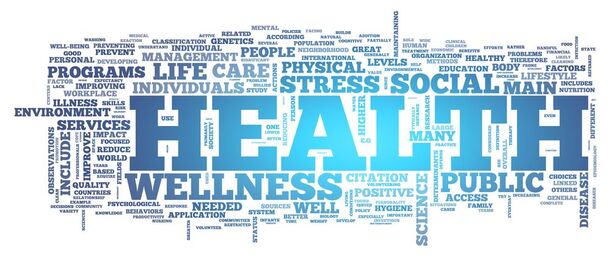
When most people are asked "what does whole health mean to you?", a combination of physical, mental, emotional, and maybe spiritual well-being usually springs to mind. But, these are only some of the factors that affect the quality of a person's life. If someone were to ask "what affects your sense of peace and security", you may say "my job", "where I live", or "having friends and family". Therefore, it would seem that your career or job, physical environment, and relationships also have roles to play in a person's well-being.
Another thing to keep in mind about health when considering these different factors is how they can affect each other. Take for example physical and environmental health. If you have bad knees, you may not be able to clean your home as well as you'd like because of the pain. Not cleaning your home properly leads to a buildup of dust and dust mites, which in turn triggers your allergy symptoms; that's your physical health affecting your environmental health which affects your physical health even more. Depending on how long that situation persists, you may become frustrated or sad because your home is not pleasing to the eyes or because of the constant coughing, sneezing, or sinus pain. Now your physical and environmental health has affected emotional health. If things continue long enough, what other part of your health will become affected? Before attempting to answer that question, let's take a brief look at seven factors that affect your well-being: 
Physical health is the state of your body as in terms of structure and mobility as well as its ability to refuel, restore, and repair. That takes into account
Mental health is about our thoughts and perceptions, how we process the information we receive. For example, if you and your friend go to an ice cream shop, and you order chocolate and they order vanilla, do you think:

Emotional health refers to our ability to identify, monitor, and express our feelings in response to information we receive. For example, when a coworker takes credit for your work, are you indifferent, disappointed but say nothing, going to calmly tell your coworker privately that you are upset they claimed your work as theirs and now consider them untrustworthy, or going to curse him out for the whole office to witness?
Job/career health addresses work-life balance, being able to meet your personal job- and career-related goals, and the degree to which the job or career is aligned with your values and interests. One's job or career health is often reflected in their desire to go to work, their productivity in the job role, and having a clearly defined purpose for remaining in that job.

Social health is the ability to interact with others to form and maintain meaningful and satisfying interpersonal relationships. These include relationships with family, friends, coworkers, the members of your Toastmasters club, your dentist, etc.. It is also the ability to adapt comfortably to different social situations and society as a whole.

Environmental health means the impact of any physical environment on your quality of life, whether it be due to climate, location, appearance, spacing, pollution, noises, potential dangers. This encompasses your home, workplace, church, city, state, and country. So, improving on your environmental health may involve adjusting the thermostat to 75 degrees at night, organizing the clutter at your work station, moving to a warmer state so that you can spend more time outdoors.
Now that we've taken a look at the parts that make up our whole health, try to think on how the health issue that impacts you the most at this moment may be affected by or is affecting other parts of your health. Let's say you are stressed (mental), because you're working long hours on an important project (job). As a result, you're not getting enough sleep (physical), because your mind is racing at night thinking about all you have to do and you have less time to spare for sleep. It also makes it difficult to enjoy yourself with friends and family (social) when there's not enough time in the day, your mind is preoccupied with work, and you are tired from lack of sleep. So, what to do? Maybe improving your mental health with stress management techniques will improve your sleep (physical) and your focus when with friends and family (social). Or having coworkers help with the project reduces your working hours (job) so that you have more time to spend with your friends and family (social) and get more sleep (physical). But, which option for obtaining better health would you choose, or is there a third or fourth option available? This is where health coaching comes in handy. A health coach works with a client not only to identify the different factors that contribute to a health concern but also help prioritize factors for change based on the client's vision of health, values, and readiness to make a change for better health. The client is the one who ultimately decides what they want to change about their health and how, and the health coach serves as a guide and resource for seeing all the options possible for achieving and maintaining better health. Health coaching provides a safe, supportive, and powerful way for you to strike a balance among all 7 aspects of your health and make a lasting health change that is most meaningful for you. Click here to learn more about integrative health coaching at My Wealth in Health!
1 Comment
|
AuthorKelly Nembhard is a certified health coach, Reiki therapist, crystal healer, and aromatherapist with experience as a clinical research professional and developmental biologist. She currently lives in Durham, NC. Archives
December 2023
Categories
All
Any medical information published on this website is not intended as a substitute for informed medical advice. You should not take any action before consulting with a healthcare professional.
|
|
© 2019-2023, My Wealth in Health. All rights reserved.
|
website designed by Kelly Nembhard
|




 RSS Feed
RSS Feed
